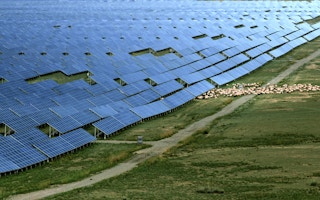As we move into the second half of this crucial year for climate action, two facts stand out: One, 82 per cent of global energy consumption still comes from fossil fuels, despite the growth of renewables in the power sector. Two, there is no plan to turn this around any time soon.
The recent Summit for a New Global Financing Pact was a welcome sign that leaders are getting serious when it comes to making the financial system fit for solving the climate crisis and alleviating poverty. But while the documents coming out of the summit all stress the role of private capital and make repeated mention of clean energy projects, a concrete plan for making such projects a reality is lacking.
Europe, North America, and China have made rapid strides in scaling up renewable energy – but there remains a glaring absence of a comprehensive global project pipeline for clean energy. Even leading clean energy nations like Denmark have yet to publish a national project pipeline.
The stark reality is that without a robust pipeline of clean energy projects across the globe, achieving climate stability within proximity to the 1.5°C target will be an insurmountable challenge.
Major infrastructure projects can entail a lengthy gestation period, requiring five to ten years from inception to operation. We don’t have the luxury of time - and if we rely on opportunism as the main strategy, the transition will be neither fair nor just. To cut emissions, we need to cut time and cut red tape. We need an immediate and colossal scale-up of large and small infrastructure projects.
This project pipeline issue was raised at last week’s Paris Summit, has been highlighted by the International Energy Agency and has been identified as a barrier to scaling renewable energy by the World Resources Institute’s Our Solar Future.
“
The stark reality is that without a robust pipeline of clean energy projects across the globe, achieving climate stability within proximity to the 1.5°C target will be an insurmountable challenge.
Our foremost priority must be expediting the development of a project pipeline aligned with the 1.5°C target.
US$2-trillion global platform
Recent advancements in technology present a new opportunity to significantly reduce the time required for building clean energy infrastructure. By leveraging the power of machine-learning and artificial intelligence, a dedicated collective of engineers, architects and technology companies could potentially establish a global pipeline of hundreds of thousands of clean energy projects aligned with the 1.5°C target within a span of 24 months.
To accomplish this, we propose the creation of an international platform that, within a year, identifies clean energy infrastructure projects worth one trillion US dollars. Within 24 months, this platform would expand its scope, identifying projects worth an unprecedented two trillion dollars.
The platform’s initial phase would involve using machine-learning techniques to identify the most suitable infrastructure sites based on a comprehensive range of criteria: solar and wind potential, demographics, proximity to transmission and, importantly, social and environmental considerations.
Taking it a step further, the system could conduct meticulous assessments to identify win-win scenarios that promote climate, nature and social goals, such as incorporating solar and wind installations into existing grazing lands or striking a balance between large-scale “mega-projects” and smaller-scale “distributed renewables” initiatives. By optimising for community-owned solar and wind installations, for example, we can help ensure a just transition that benefits all stakeholders.
The benefits of this initiative extend beyond developers and investors. Governments gain access to off-the-shelf, detailed and practical roadmaps that support their journey toward achieving net-zero targets. International donors and development partners can anticipate a nimble and rapidly expanding platform that delivers a pipeline of low-cost, sustainable electricity. The platform, particularly in emerging markets like Asia, Africa, and South America, unlocks untapped solar and wind opportunities, providing low-cost and sustainable electricity options.
Risk-taking mentality
This has not been done before. Yes, there are feasibility assessments demonstrating that powering the world with clean energy is indeed possible. Yes, wind and solar maps, databases, and reports from institutions like the Global Energy Monitor, the International Renewable Energy Agency (IRENA), and the International Energy Agency (IEA) abound. But current endeavours lack the granular project-level detail required to expedite implementation, and they hinge on the slow wheels of government and intergovernmental agencies turning faster.
We cannot afford to wait. Instead, we must embrace the spirit of innovation and adopt a risk-taking start-up mentality. Just as countless disruptive companies have revolutionised industries, reinvented business models, and swiftly brought unimaginable solutions to market, we can adopt a similar mindset to address our climate emergency.
The Intergovernmental Panel on Climate Change’s latest report has unequivocally made clear that the window for a livable future on Earth is rapidly closing. But the cost of clean energy technologies has dropped 60-80 per cent in the last decade and is set to fall further. With a clean-energy pipeline to help open the door to private investment, we can stabilise temperature close to the crucial 1.5°C target.
This story was published with permission from Thomson Reuters Foundation, the charitable arm of Thomson Reuters, that covers humanitarian news, climate change, resilience, women’s rights, trafficking and property rights. Visit https://www.context.news/.











